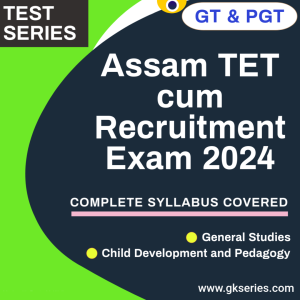Pedagogy Questions & Answers for Assam Graduate Teacher(GT) and Postgraduate Teacher(PGT) 2024

Pedagogy is a very important part of Teacher Eligibility Exam(TET) Exam. In this post we have added important Pedagogy Questions & Answers for Assam Graduate Teacher(GT) and Postgraduate Teacher(PGT) 2024.
Assam GT & PGT Exam 2024 – Pedagogy Questions & Answers
1. The principle of programmed learning is
(a) Presenting the subject matter in small frames
(b) Continuing the learning process
(c) Continuous Evaluation
(d) All of these
Answer: All of these
CLICK HERE TO JOIN ASSAM GT & PGT TET TEST SERIES
2. What is the main aim of teaching?
(a) To provide notes to the students
(b) To build thinking power of students
(c) To do revision before examinations
(d) To prepare the students for jobs
Answer: To build thinking power of students

3. Which technology is used to achieve the educational aims incase these aims have not been achieved?
(a) Educational Technology
(b) Instructional Technology
(c) Behavioural Technology
(d) Instructional Format
Answer: Educational Technology
4. What is included in the field of study of Child development?
(a) The assessment of change of human capabilities
(b) The comparison of children with adults and senior citizens
(c) The gradual evolution of the child’s cognitive, social, and other capabilities
(d) The change of behaviour of the child during the life span
Answer: The gradual evolution of the child’s cognitive, social, and other capabilities
5. ‘Team teaching’
(a) involves teams of teachers to optimize resources, interest & expertise
(b) is a way out to manage with the shortage of teachers
(c) encourage healthy competition among teams of teachers in a school
(d) involves small teams of students as per their ability.
Answer: involves teams of teachers to optimize resources, interest & expertise.
CLICK HERE TO JOIN ASSAM GT & PGT TET TEST SERIES
6. What is ‘Interactive’ listening?
(a) Listening for mood
(b) Listening and responding
(c) Listening for word stress
(d) All of these
Answer: Listening and responding
7. The teaching method, in which two or more teachers make a plan of the subjects co- operatively carry it out & always evaluate its effect on the students periodically is called
(a) Audio-Visual teaching
(b) Team teaching
(c) Visual teaching
(d) Individual teaching
Answer: Team teaching
1000+ Pedagogy Questions & Answers(MCQs)
8. Which of the following methods is use for teaching science in the present era of technology?
(a) Programmed Instruction
(b) Team Teaching
(c) Computer Assisted Teaching
(d) All of these
Answer: All of these
9. Which one of the following is not one of the advantages of ‘Team Teaching Method’?
(a) It helps in sharing the best faculty by more students
(b) It involves optimum use of teaching techniques and devices
(c) It improves the teaching quality
(d) It affects the socio-economic conditions of the pupils
Answer: It helps in sharing the best faculty by more students
10. If some students are not in a mood to study in the class. You will
(a) force them to study
(b) tell those students to leave the class
(c) warn them that they must study or else you will repot the matter to the principal
(d) tell them some interesting things related to their interest or your own subject.
Answer: tell them some interesting things related to their interest or your own subject.

11. Which type of role Parents should play in the learning process of young children.
(a) sympathetic
(b) neutral
(c) negative
(d) proactive
Answer: proactive
CLICK HERE TO JOIN ASSAM GT & PGT TET TEST SERIES
12. Which one of the following is not a part of a stage proposed by Kohlberg in his Theory of Moral Development ?
(a) Self-interest and reward
(b) Relationships with others
(c) Social contract and social rights
(d) Following universal ethical principles
Answer: Social contract and social rights
13. Children in primary schools follow which of the following stages as proposed by Lawrence Kohlberg?
A. Obedience and Punishment Orientation
B. Individualism and Exchange
C. Good Interpersonal Relationships
D. Social Contract and Individual Rights
(a) B and A
(b) B and D
(c) A and D
(d) A and C
Answer: B and A
14. What do you understand by traditional grammar?
(a) It lays emphasis on rules and regulations
(b) It marks a difference between what one writes and what one speaks
(c) It teaches a language
(d) All of these
Answer: All of these
15. The most primitive sentiment expressed by the child in the early childhood is
(a) his love for his own self
(b) his love for his toys
(c) his love for his parents
(d) All of the above
Answer: his love for his own self
16. Gifted students are
(a) independent in their judgements
(b) independent of teachers
(c) introvert in nature
(d) non-assertive of their needs
Answer: independent in their judgements
17. Group activities are the best source for
(a) improving the performance of children & become socialized
(b) deteriorating the performance of children
(c) diverting children
(d) influencing them in a certain way
Answer: improving the performance of children & become socialized
18. What should be a teacher’s attitude towards the backward students in the class?
(a) ignorant
(b) harsh
(c) motivator
(d) lovable
Answer: motivator
